1 - The World Imaginaries of Islam: Islam and New Directions in World Literature
Published online by Cambridge University Press: 14 July 2023
Summary
The Imaginaries of Islam in World Literature
One of the biggest programmes and summer schools of World Literature, the Harvard Institute of World literature, is housed at Harvard University and locates to a different country every year to be then housed at its home in the third year in Boston, Harvard. The Institute of World Literature began its first chapter in 2011 in Beijing and subsequently all chapters located abroad were placed either in the Far East (Beijing, Hong Kong, Tokyo) or Europe (Copenhagen, Lisbon), the only exception to this mapping is Istanbul in 2012 – located between Europe and the Middle East. Interestingly enough, the Istanbul chapter was the only one dealing with the Islamicate (a term borrowed from Marshall Hodgson, which we will unpack and engage with, taking stock of Shahab Ahmed’s critique, in due course) world literature in parts, featuring the usual suspect of Islamicate World Literature: The Thousand and One Nights. Other seminars included Westernisation in Turkish and Russian Fiction and another on Orientalism and World Literature, befittingly in Istanbul.
While these programmes are indeed a commendable effort, their trajectories are still aligned with the origins and interests of World Literature as a Goethean enterprise. Some of the multi-volume anthologies and companions published in the field of World Literature do acknowledge the presence of the Islamicate as World Literature, especially The Longman Anthology of World Literature (2008, 2nd edition), which seems like a pioneering effort in this regard. It is a two-volume anthology; volume 1 covers a period spanning from the ancient world until the early modern period. In this volume, there is an entire section devoted to literatures from the Islamicate titled ‘Classical Arabic and Islamic Literatures’ with a subsection on ‘Pre-Islamic Poetry’ featuring a wide selection from Imrūʾ al-Qays, al-Khansāʾ to the Brigand Poets. Then there is a section from the Qurʾān composed of a wide selection of suras as well as a selection from Ibn Saʿad on ‘The Prophet and his Disciples’ – notwithstanding, of course, that the Prophet Muḥammad did not have ‘disciples’ but had companions.
- Type
- Chapter
- Information
- Islam and New Directions in World Literature , pp. 1 - 54Publisher: Edinburgh University PressPrint publication year: 2022



